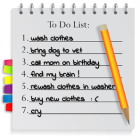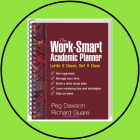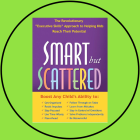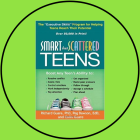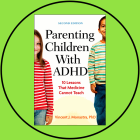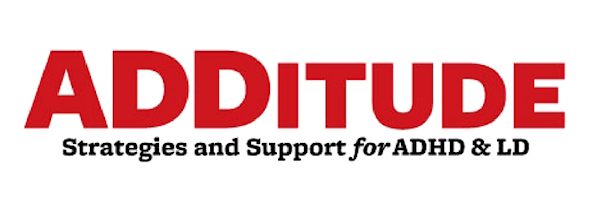Tag Archives:add
Executive Functioning Skills share
What are these skills you speak of?
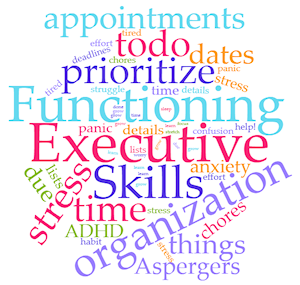 “Executive functioning skills” is a term that is used to describe our brain’s ability to plan, organize, and complete tasks. Brain functions such as short-term memory, mental flexibility, and self-control are all involved in these types of tasks. In your day to day life, this means that you are capable of developing strong executive functioning skills if your brain does well with remembering, being able to shift gears or “think outside of the box,” and being self-aware enough to enable you to control impulses and adjust your actions when change is helpful. If you are lucky enough to have strong executive functioning skills you will more easily develop the ability to:
“Executive functioning skills” is a term that is used to describe our brain’s ability to plan, organize, and complete tasks. Brain functions such as short-term memory, mental flexibility, and self-control are all involved in these types of tasks. In your day to day life, this means that you are capable of developing strong executive functioning skills if your brain does well with remembering, being able to shift gears or “think outside of the box,” and being self-aware enough to enable you to control impulses and adjust your actions when change is helpful. If you are lucky enough to have strong executive functioning skills you will more easily develop the ability to:
- Find things when you need them rather than spending half of your planned task activity just trying to locate the items that you need.
- Keep track of tasks that need to get taken care of or appointments/dates to keep instead of constantly needing to apologize for forgetting to do things or show up when you promised to.
- Prioritize things that are the most important over accomplishing other perhaps the easier ones…or the ones that are less tedious…or the ones that just happen to be in front of your face (I call these rabbit holes…a major weakness of mine, I go down rabbit holes all the time. My professional husband also uses the term, “project creep” when he is encouraging me to avoid it and stay on task. ).
- Chunk/plan out long term projects so that you can gather the necessary materials and then work on them gradually rather than leaving it all to the last minute.
- Estimate how long a task will take, fairly accurately, so that as you plan things in your schedule or on your “To Do” list, you have reasonable expectations of yourself rather than expecting yourself to have 8 hands and 2 brains and then feel like a failure when you don’t accomplish everything on your list.
The Work-Smart Academic Planner: Write It Down, Get It Done by Peg Dawson EdD & Richard Guare PhD share
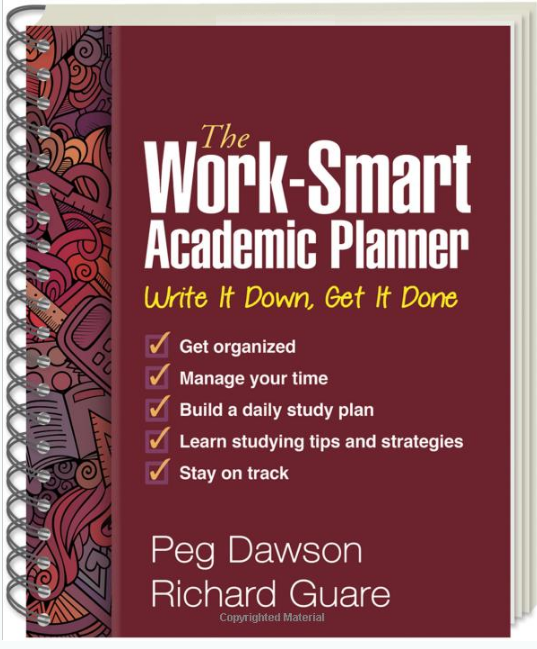 A review of this is yet to come. I have ordered my copy… just learned that this planner exists! Amazon reports that it’s geared to kids in 6-12th grades. These authors have two other books that I recommend, Smart but Scattered & Smart But Scattered Teens. The authors’ do a great job of making things understandable in a way that doesn’t leave the reader feeling stupid. When you struggle with these skills, it can be easy to get down on yourself. These authors can do a great job of pulling you back up to feeling like you are smart and capable. So, this letter might be worth having.
A review of this is yet to come. I have ordered my copy… just learned that this planner exists! Amazon reports that it’s geared to kids in 6-12th grades. These authors have two other books that I recommend, Smart but Scattered & Smart But Scattered Teens. The authors’ do a great job of making things understandable in a way that doesn’t leave the reader feeling stupid. When you struggle with these skills, it can be easy to get down on yourself. These authors can do a great job of pulling you back up to feeling like you are smart and capable. So, this letter might be worth having.
* I don’t make any money from the books that I recommend. My reviews are solely based on wanting to let people know what’s out there and could be helpful to them.
Smart But Scattered by Peg Dawson, EdD & Richard Guare, PhD share
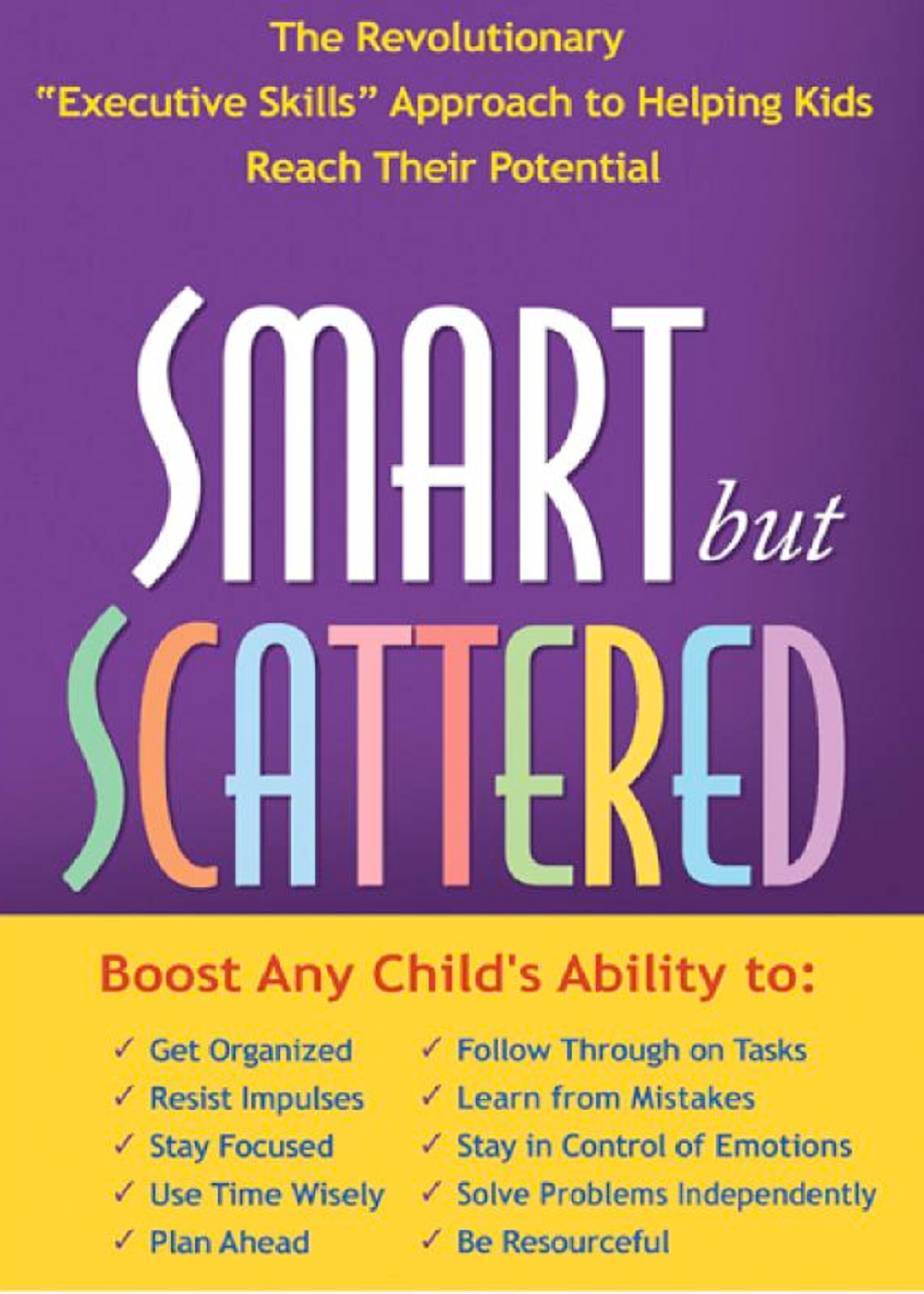 While I own this book, I have not had a chance to give it a read. It is geared towards parents of 4-13 year-old kids. You can check out my review of their companion book, Smart but Scattered Teens, which I suspect is pretty similar to this one. Additionally, in creating this review, I was excited to learn that they now have a Work-Smart Academic Planner that I will be reviewing as soon as I get my hands on a copy!
While I own this book, I have not had a chance to give it a read. It is geared towards parents of 4-13 year-old kids. You can check out my review of their companion book, Smart but Scattered Teens, which I suspect is pretty similar to this one. Additionally, in creating this review, I was excited to learn that they now have a Work-Smart Academic Planner that I will be reviewing as soon as I get my hands on a copy!
* I don’t make any money from the books that I recommend. My reviews are solely based on wanting to let people know what’s out there and could be helpful to them.
Smart But Scattered Teens by Richard Guare, PhD, Peg Dawson, EdD, and Colin Guare share
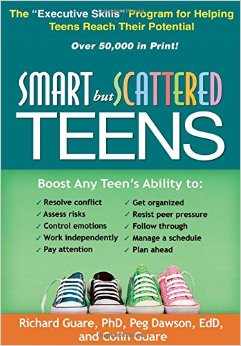 With a sense of humor and practicality, the authors of this book provide concrete, step-by-step ways to take a look at your teen’s (and yours!) strengths and weaknesses in terms of organization and planning. They then provide information about how people’s brains work and how having “executive functioning” challenges effects people’s day-to-day lives. They guide you through ways to improve these types skills with respect and compassion. The thing I like most about this book is that they emphasize that people with very smart brains can struggle with these skills. Geared to the 13 and up crowd, they also have companion books for younger kids (Smart but Scattered) as well as a new, Work-Smart Academic Planner that I’m excited to be checking out!
With a sense of humor and practicality, the authors of this book provide concrete, step-by-step ways to take a look at your teen’s (and yours!) strengths and weaknesses in terms of organization and planning. They then provide information about how people’s brains work and how having “executive functioning” challenges effects people’s day-to-day lives. They guide you through ways to improve these types skills with respect and compassion. The thing I like most about this book is that they emphasize that people with very smart brains can struggle with these skills. Geared to the 13 and up crowd, they also have companion books for younger kids (Smart but Scattered) as well as a new, Work-Smart Academic Planner that I’m excited to be checking out!
* I don’t make any money from the books that I recommend. My reviews are solely based on wanting to let people know what’s out there and could be helpful to them.
Parenting Children with ADHD: 10 Lessons That Medication Can’t Teach by Vincent J. Monastra, PhD share
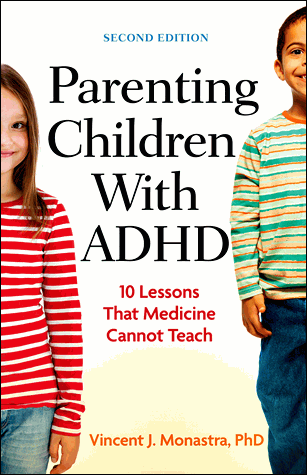 Written by a psychologist who has lots of experience working with kids with ADHD, this is an easy-to-read book that is broken down into short chapters giving a nice overview of ADHD and explaining things that are important for kids with these issues that doesn’t involve medication. Also, it’s not that Dr. Monastra is anti-medication, it’s just that his experience (and scientific research) has shown that there are additional/other interventions that can be helpful for kids (and adults!) with ADHD. Basically, medication alone is not enough. He talks about things like diagnosis, the role of medication and what it can and can’t do, how to work with the school to support your child’s success, developing emotional control, and giving yourself a break as a parent.
Written by a psychologist who has lots of experience working with kids with ADHD, this is an easy-to-read book that is broken down into short chapters giving a nice overview of ADHD and explaining things that are important for kids with these issues that doesn’t involve medication. Also, it’s not that Dr. Monastra is anti-medication, it’s just that his experience (and scientific research) has shown that there are additional/other interventions that can be helpful for kids (and adults!) with ADHD. Basically, medication alone is not enough. He talks about things like diagnosis, the role of medication and what it can and can’t do, how to work with the school to support your child’s success, developing emotional control, and giving yourself a break as a parent.
Excerpt from the publisher’s summary: “Kids with ADHD need to be loved and shown how to become successful adults. Unfortunately, their lack of attention and restlessness often get in the way. Parents of these kids try so hard to stay connected and remain patient in the face of daily frustration. However, it is an incredible challenge to remain positive and involved when your child does not respond to the kinds of strategies that work for other children. Without guidance and systematic treatment, these bright, inquisitive children are unlikely to graduate from high school, are more prone to use illegal drugs, and struggle to maintain employment as adults.”
Note: I have the 2005 version. In writing this post I see that there is a 2014 version. So I don’t know what has changed between the two.
* I don’t make any money from the books that I recommend. My reviews are solely based on wanting to let people know what’s out there and could be helpful to them.
What to Do When Your TEMPER FLARES by Dawn Huebner, PhD share
 This is a fabulous workbook for kids. The book suggests using it from ages 6-12 but I think that is a loose guide and depends on the mindset of the child as well as their ability to understand that other people’s thoughts can be different than their own. Using fire as a metaphor for anger, the words and pictures then walk the reader through several different skills and approaches that can help a person develop a “longer fuse.” Explanations are concrete, using visual metaphors and practice to help increase skills that are very effective in managing anger. The author teaches, among other things, how our inner thoughts can affect our feelings and that if we work to adjust our thinking and give situations more of the benefit of the doubt,
This is a fabulous workbook for kids. The book suggests using it from ages 6-12 but I think that is a loose guide and depends on the mindset of the child as well as their ability to understand that other people’s thoughts can be different than their own. Using fire as a metaphor for anger, the words and pictures then walk the reader through several different skills and approaches that can help a person develop a “longer fuse.” Explanations are concrete, using visual metaphors and practice to help increase skills that are very effective in managing anger. The author teaches, among other things, how our inner thoughts can affect our feelings and that if we work to adjust our thinking and give situations more of the benefit of the doubt,
I use this book in session with some of my clients. Parents can also use this on their own with their kids and there is an introduction in the beginning of the book to help guide parents through how to approach it. With a positive, supportive approach you can really deepen your relationship with your child by being a resource that can help him or her to work through these challenges.
* I don’t make any money from the books that I recommend. My reviews are solely based on wanting to let people know what’s out there and could be helpful to them.
ADHD: ADDitude share
(PLEASE READ my cautionary note at the end of the description in this post.)
This website is chock full of ideas and resources. I like it because it provides information in quick, easy to digest chunks, perfect for the ADHD soul. You can subscribe to enewsletters that will send out information on specific topics. They also offer free webinars presented by people who work with individual with ADHD or have it themselves.
I find that this site is really a great way to begin to familiarize yourself with how the ADHD brain works and what approaches and strategies can be the most helpful in coping with some of the challenges the ADHD brain can present. It also does this in a way that celebrates the strengths of ADHD brain, which I really like.
CAUTIONARY NOTE: I admit that I have mixed feelings about this website. I’m listing it because it does provide access to a lot of wonderful information. However, the advertisements have a heavy push to encourage people to spend hundreds of dollars on “ADHD Coaches.” I have no experience with anyone in that line of work. I do know that there is no licensure for ADHD coaches so you would have to do your own investigation to make sure that, should you ever choose to try that option, you are working with someone who is skilled and worth the money. I don’t find that it is necessary to have an ADHD coach to be able to work through some of the challenges that having ADHD can present, however I don’t rule out that they can be helpful in the right circumstances. Self-education, trial & error, working with a licensed professional (which insurance will often pay for), these are all things that can promote growth and change without such a large expense as paying out of pocked for a coach.

